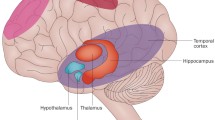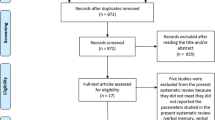Abstract
Endocrine-based treatments are the mainstay of therapy for postmenopausal women with breast cancer; yet concern has been raised about potential adverse cognitive effects. We performed a systematic review of the published literature to evaluate whether endocrine-based treatments for breast cancer are associated with changes in cognitive domains and whether these effects are more pronounced with advanced age. An electronic database search was performed. Original investigations that examined the effects of endocrine treatment on cognitive function were identified. Data were abstracted and studies were assessed for risk of bias. A total of 21 unique studies (n = 2398) were identified. Ten were short-term (duration ≤ 2 years) and 11 were long-term (duration > 2 years). Nine (43 %) studies had a sample size ≤100 subjects; 9 (43 %) were longitudinal, with baseline measurement before treatment initiation. No studies were primary randomized clinical trials. While there was heterogeneity in the neuropsychological measures used, tests could be grouped into the cognitive domains that they assessed. Compared to breast cancer or healthy controls, endocrine therapy was associated with impaired performance on neuropsychological testing. No study explored the association between age and changes in cognitive performance. Overall, endocrine therapies were associated with greater cognitive deficits compared to surgical and healthy controls; yet, lack of randomized trial data and heterogeneity in design of many studies limited any definitive conclusions. Despite older women being at highest risk for the development of cognitive impairment, advanced age has not been adequately explored.

Similar content being viewed by others
References
DeSantis C, Ma J, Bryan L, Jemal A (2014) Breast cancer statistics, 2013. CA Cancer J Clin 64(1):52–62
Burstein HJ, Griggs JJ, Prestrud AA, Temin S (2010) American society of clinical oncology clinical practice guideline update on adjuvant endocrine therapy for women with hormone receptor-positive breast cancer. J Clin Oncol 6(5):243–246
Laird-Fick HS, Gardiner JC, Tokala H, Patel P, Wei S, Dimitrov NV (2013) HER2 status in elderly women with breast cancer. J Geriatr Oncol 4(4):362–367
Tralongo P, Dimari A, Repetto L (2005) Aromatase inhibitors and mental function. J Am Geriatr Soc 53(1):166
Birge SJ (2003) The use of estrogen in older women. Clin Geriatr Med 19(3):617–627
Knopman DS, Roberts RO, Pankratz VS et al (2014) Incidence of dementia among participants and nonparticipants in a longitudinal study of cognitive aging. Am J Epidemiol 180(4):414–423
Palmieri C, Patten DK, Januszewski A, Zucchini G, Howell SJ (2014) Breast cancer: current and future endocrine therapies. Mol Cell Endocrinol 382(1):695–723
Johnston SRD, Dowsett M (2003) Aromatase inhibitors for breast cancer: lessons from the laboratory. Nat Rev Cancer 3:821–831
Bakoyiannis I, Tsigka EA, Perrea D et al (2016) The impact of endocrine therapy on cognitive functions of breast cancer patients: a systematic review. Clin Drug Investig 36(2):109–118
Wefel JS, Vardy J, Ahles T, Schagen SB (2011) International cognition and cancer task force recommendations to harmonise studies of cognitive function in patients with cancer. Lancet Oncol 12(7):703–708
Shilling V, Jenkins V, Fallowfield L, Howell T (2003) The effects of hormone therapy on cognition in breast cancer. J Steroid Biochem Mol Biol 86(3–5):405–412
Schilder CM, Schagen SB (2007) Effects of hormonal therapy on cognitive functioning in breast cancer patients: a review of the literature. Minerva Ginecol 59(4):387–401
Jenkins VA, Ambroisine LM, Atkins L, Cuzick J, Howell A, Fallowfield LJ (2008) Effects of anastrozole on cognitive performance in postmenopausal women: a randomised, double-blind chemoprevention trial (IBIS II). Lancet Oncol 9(10):953–961
Bender CM, Sereika SM, Brufsky AM et al (2007) Memory impairments with adjuvant anastrozole versus tamoxifen in women with early-stage breast cancer. Menopause 14(6):995–998
Hurria A, Patel SK, Mortimer J et al (2014) The effect of aromatase inhibition on the cognitive function of older patients with breast cancer. Clin Breast Cancer 14(2):132–140
Breckenridge LM, Bruns GL, Todd BL, Feuerstein M (2012) Cognitive limitations associated with tamoxifen and aromatase inhibitors in employed breast cancer survivors. Psychooncology 21(1):43–53
Palmer JL, Trotter T, Joy AA, Carlson LE (2008) Cognitive effects of Tamoxifen in pre-menopausal women with breast cancer compared to healthy controls. J Cancer Surviv 2:275–282
Chen X, Li J, Chen J et al (2014) Decision-making impairments in breast cancer patients treated with tamoxifen. Horm Behav 66:449–456
Castellon SA, Ganz PA, Bower JE, Petersen L, Abraham L, Greendale GA (2004) Neurocognitive performance in breast cancer survivors exposed to adjuvant chemotherapy and tamoxifen. J Clin Exp Neuropsychol 26(7):955–969
Prokasheva S, Faran Y, Cwikel J, Geffen DB (2011) Analysis of memory deficits following chemotherapy in breast cancer survivors: evidence from the doors and people test. J Psychosoc Oncol 29(5):499–514
Stang A (2010) Critical evaluation of the Newcastle-Ottawa scale for the assessment of the quality of nonrandomized studies in meta-analyses. Eur J Epidemiol 25(9):603–605
Collins B, Mackenzie J, Stewart A, Bielajew C, Verma S (2009) Cognitive effects of hormonal therapy in early stage breast cancer patients: a prospective study. Psychooncology 18(8):811–821
Debess J, Riis JO, Engebjerg MC, Ewertz M (2010) Cognitive function after adjuvant treatment for early breast cancer: a population-based longitudinal study. Breast Cancer Res Treat 121(1):91–100
Hedayati E, Alinaghizadeh H, Schedin A, Nyman H, Albertsson M (2012) Effects of adjuvant treatment on cognitive function in women with early breast cancer. Eur J Oncol Nurs 16(3):315–322
Schilder CM, Seynaeve C, Beex LV et al (2010) Effects of tamoxifen and exemestane on cognitive functioning of postmenopausal patients with breast cancer: results from the neuropsychological side study of the tamoxifen and exemestane adjuvant multinational trial. J Clin Oncol 28(8):1294–1300
Bender CM, Sereika SM, Berga SL et al (2006) Cognitive impairment associated with adjuvant therapy in breast cancer. Psycho-Oncology 15:422–430
Hermelink K, Henschel V, Untch M, Bauerfeind I, Lux MP, Munzel K (2008) Short-term effects of treatment-induced hormonal changes on cognitive function in breast cancer patients: results of a multicenter, prospective, longitudinal study. Cancer 113(9):2431–2439
Ganz PA, Petersen L, Castellon SA et al (2014) Cognitive function after the initiation of adjuvant endocrine therapy in early-stage breast cancer: an observational cohort study. J Clin Oncol 32(31):3559–3567
Eberling JL, Wu C, Tong-Turnbeaugh R, Jagust WJ (2004) Estrogen- and tamoxifen-associated effects on brain structure and function. Neuroimage 21(1):364–371
Jenkins V, Shilling V, Fallowfield L, Howell A, Hutton S (2004) Does hormone therapy for the treatment of breast cancer have a detrimental effect on memory and cognition? a pilot study. Psychooncology 13(1):61–66
Lejbak L, Vrbancic M, Crossley M (2010) Endocrine therapy is associated with low performance on some estrogen-sensitive cognitive tasks in postmenopausal women with breast cancer. J Clin Exp Neuropsychol 32(8):836–846
Boele FW, Schilder CM, de Roode ML, Deijen JB, Schagen SB (2015) Cognitive functioning during long-term tamoxifen treatment in postmenopausal women with breast cancer. Menopause 22(1):17–25
Phillips KA, Aldridge J, Ribi K et al (2011) Cognitive function in postmenopausal breast cancer patients one year after completing adjuvant endocrine therapy with letrozole and/or tamoxifen in the BIG 1-98 trial. Breast Cancer Res Treat 126(1):221–226
Jenkins V, Shilling V, Deutsch G et al (2006) A 3-year prospective study of the effects of adjuvant treatments on cognition in women with early stage breast cancer. Br J Cancer 94(6):828–834
Schilder CM, Eggens PC, Seynaeve C et al (2009) Neuropsychological functioning in postmenopausal breast cancer patients treated with tamoxifen or exemestane after AC-chemotherapy: cross-sectional findings from the neuropsychological TEAM-side study. Acta Oncol 48(1):76–85
Burton M, Collins K, Caldon L, Wyld L, Reed M (2014) Information needs of older women faced with a choice of primary endocrine therapy or surgery for early-stage breast cancer: a literature review. Curr Breast Cancer Rep 6(3):235
Mandelblatt JS, Stern RA, Luta G et al (2014) Cognitive impairment in older patients with breast cancer before systemic therapy: is there an interaction between cancer and comorbidity? J Clin Oncol 32(18):1909–1918
Ahles TA, Saykin AJ, McDonald BC et al (2008) Cognitive function in breast cancer patients prior to adjuvant treatment. Breast Cancer Res Treat 110(1):143–152
Reuter-Lorenz PA, Cimprich B (2013) Cognitive function and breast cancer: promise and potential insights from functional brain imaging. Breast Cancer Res Treat 137(1):33–43
Zwart W, Huub T, Linn SC et al (2015) Cognitive effects of endocrine therapy for breast cancer: keep calm and carry on? Nat Rev Clin Oncol 12:597–606
Disclaimers
None to declare. The funding organizations did not participate in the design or conduct of the study, in the collection, analysis, or interpretation of the data, or in the preparation, review, or approval of the manuscript.
Funding
This study was conducted with the support of the Ontario Institute for Cancer Research and Cancer Care Ontario through funding provided by the Government of Ontario. Dr. Tierney was supported by a Clinician Scientist Award from the Department of Family & Community Medicine, University of Toronto and Sunnybrook Health Sciences Centre.
Author information
Authors and Affiliations
Corresponding author
Electronic supplementary material
Below is the link to the electronic supplementary material.
Rights and permissions
About this article
Cite this article
Lee, P.E., Tierney, M.C., Wu, W. et al. Endocrine treatment-associated cognitive impairment in breast cancer survivors: evidence from published studies. Breast Cancer Res Treat 158, 407–420 (2016). https://doi.org/10.1007/s10549-016-3906-9
Received:
Accepted:
Published:
Issue Date:
DOI: https://doi.org/10.1007/s10549-016-3906-9




